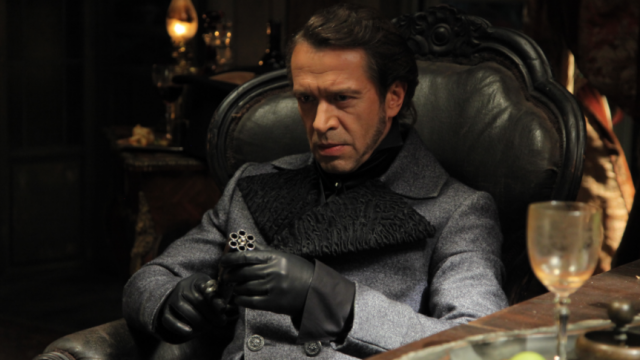There’s a scene at the very end of “Loveless,” Russian director Andrei Zvyagintsev’s new film, that could be seen to firmly rebut any notion that the movie has no political agenda.
The camera pans around an apartment where Zhenya, the female lead, now lives with her new boyfriend following a fractious divorce. On television, Dmitry Kiselyov, Russia’s notorious media propagandist and TV presenter, is discussing the Battle of Debaltseve, one of the most fiercely fought offensives in the ongoing conflict in eastern Ukraine. As Zhenya walks out onto the balcony and starts jogging on a treadmill, the camera zooms in on the word “Russia” on her Bosco tracksuit and lingers there before fading to black.
This ending is somewhat unexpected, given that the movie is on the surface a harrowing domestic drama. The previous two hours are devoted to exploring the relationship between Zhenya and her husband Boris, who are in the process of an acrimonious divorce when their 12-year-old son vanishes.
When confronted about this controversial final shot, Zvyagintsev merely responded that this particular brand serves as a time signifier, since Bosco sportswear was particularly popular during and after the Sochi Winter Olympics in 2014 (the company designed the official Russian team kit).
Nonetheless, for Zvyagintsev it will be difficult to escape accusations that the film has a political subtext, given the explorations of the amorality and social ills of contemporary Russia that characterized his previous two movies “Leviathan” and “Elena.”
In the Oscar-nominated “Leviathan,” he painted a bleak portrait of provincial corruption, alcoholism and one man’s futile struggle against the state machinery in an ambitious retelling of the Book of Job. “Elena,” while smaller in scope, was no less forgiving in its depiction of a society that has lost its sense of right and wrong in the moral vacuum left by the collapse of the Soviet Union.
Unsurprisingly, such a conscious focus on the ills of the country cuts close to the bone for many Russians. Even before the release of “Loveless,” Russian-language social media was full of statements like: “Never watched Zvyagintsev’s films and don’t intend to.” The critics have also been divided, with some, like Anton Dolin of Meduza, praising the movie’s timeliness and depiction of civil society, while others, like Konstantin Milchin, chief editor of literary website Gorky, blaming Zvyagintsev for “hating homo sapiens as a genus.”
The controversy surrounding Zvyagintsev and his works is one of the reasons “Loveless” was filmed with zero financial support from the government.
“The Minister [of Culture Vladimir Medinsky] still recalls “Leviathan” so often and with such ‘warmth’ that I didn’t want to cause him any trouble again,” jokes Alexander Rodnyansky, producer of Zvyagintsev’s last three movies. “We wanted to let Andrei [Zvyagintsev] make the movie he wanted to make. It’s a matter of principle for me,” he added.
“Loveless” has already won over the critics, winning the jury prize at Cannes, one of the top awards at the festival. The rights have been bought by distributors from most countries, so people outside Russia will soon be able to see the film.
Unlike “Leviathan,” the new cast doesn’t include any stars. For Maryana Spivak, who plays Zhenya, it’s her first role in cinema, although regular visitors to Moscow’s Satirikon theater will easily recognize her face. Alexei Rozin, who plays Boris, Zhenya’s estranged husband, also appeared in “Elena” and “Leviathan,” but hardly anywhere else. Boris’ lover is played by Marina Vasilyeva, famous for her role in “Name Me,” a 2014 favorite at art-house festivals.
Possibly the only positive character in the movie is not a person, but an organization. The search and rescue volunteers that help the couple to look for their kid were based on a real-life organization, Liza Alert. In “Loveless” the volunteers’ organization serves as a substitute for the government authorities, which are unwilling to help search for Boris and Zhenya’s lost son.
Like “Leviathan,” the film uses specific timestamps to anchor the action in a recent period of Russian history. In the first minutes of the movie we hear a radio host talking about Barack Obama’s second election campaign and it becomes clear that it is October 2012. The closing scene, with the mention of Debaltseve, places the end of the movie in February 2015.
Regarding the controversial final shots, Zvyagintsev says he had not thought of any alternative endings: “Any other ending won’t work or will only work for the benefit of the viewer who could breath out before the final title sequence, calm down and say “Thank God, everything’s all right.”
A movie that stays with you long after you’ve watched it, “Loveless” encourages reflection on your own fate and place in the world.
“We made this movie so that the viewer goes home and embraces his loved ones,” says Zvyagintsev, adding that it doesn’t matter what happens to the characters after the film: “There’s a black screen and titles start and after that everything is happening to the viewer.”
“That’s the objective—that the movie gets
into the viewer’s heart, his consciousness,
his soul. The movie is just an excuse to think
about oneself. What we see on the screen
are only shadows, shadows of our fears, our
doubts, our dreams.”
A Message from The Moscow Times:
Dear readers,
We are facing unprecedented challenges. Russia's Prosecutor General's Office has designated The Moscow Times as an "undesirable" organization, criminalizing our work and putting our staff at risk of prosecution. This follows our earlier unjust labeling as a "foreign agent."
These actions are direct attempts to silence independent journalism in Russia. The authorities claim our work "discredits the decisions of the Russian leadership." We see things differently: we strive to provide accurate, unbiased reporting on Russia.
We, the journalists of The Moscow Times, refuse to be silenced. But to continue our work, we need your help.
Your support, no matter how small, makes a world of difference. If you can, please support us monthly starting from just $2. It's quick to set up, and every contribution makes a significant impact.
By supporting The Moscow Times, you're defending open, independent journalism in the face of repression. Thank you for standing with us.
Remind me later.






